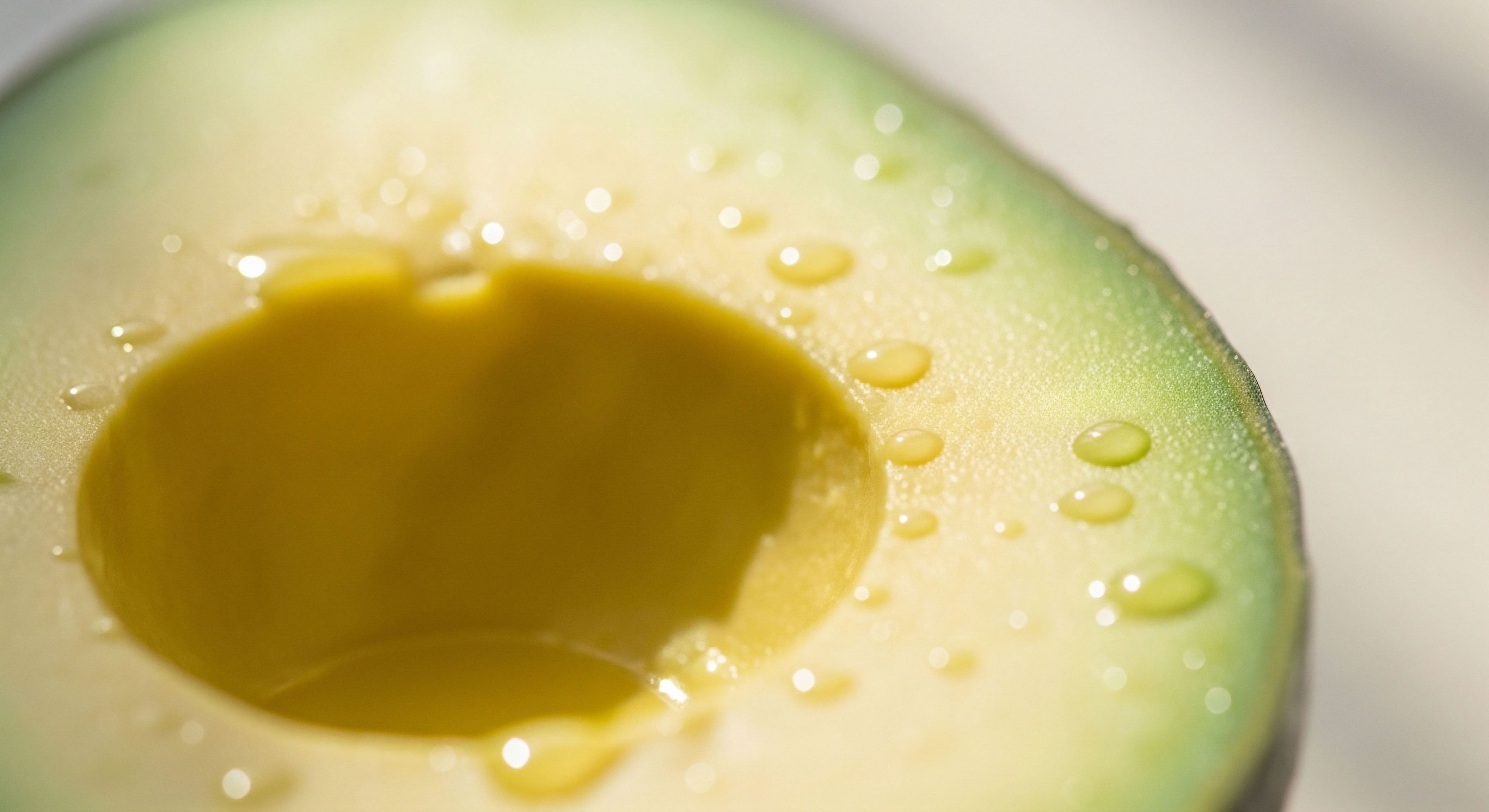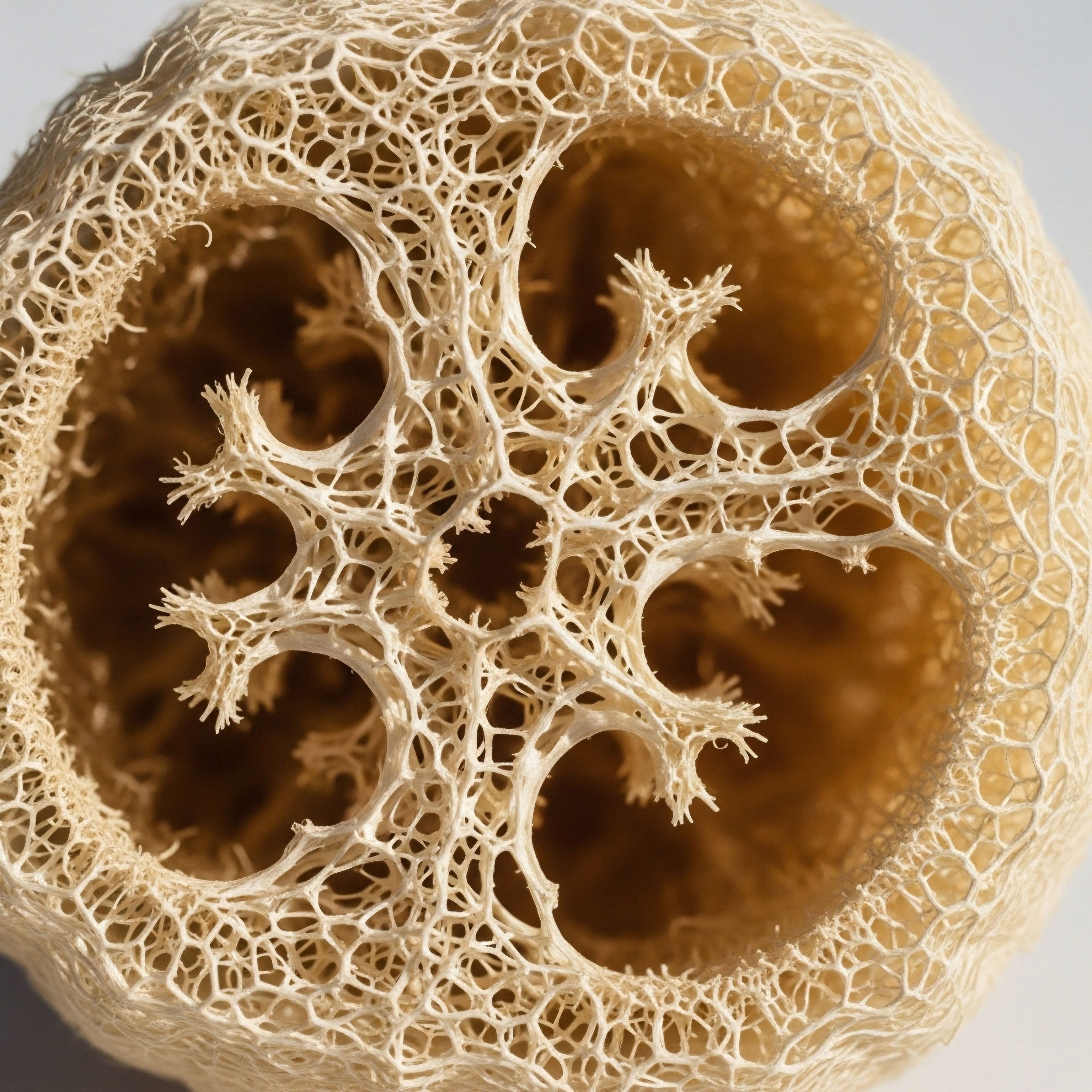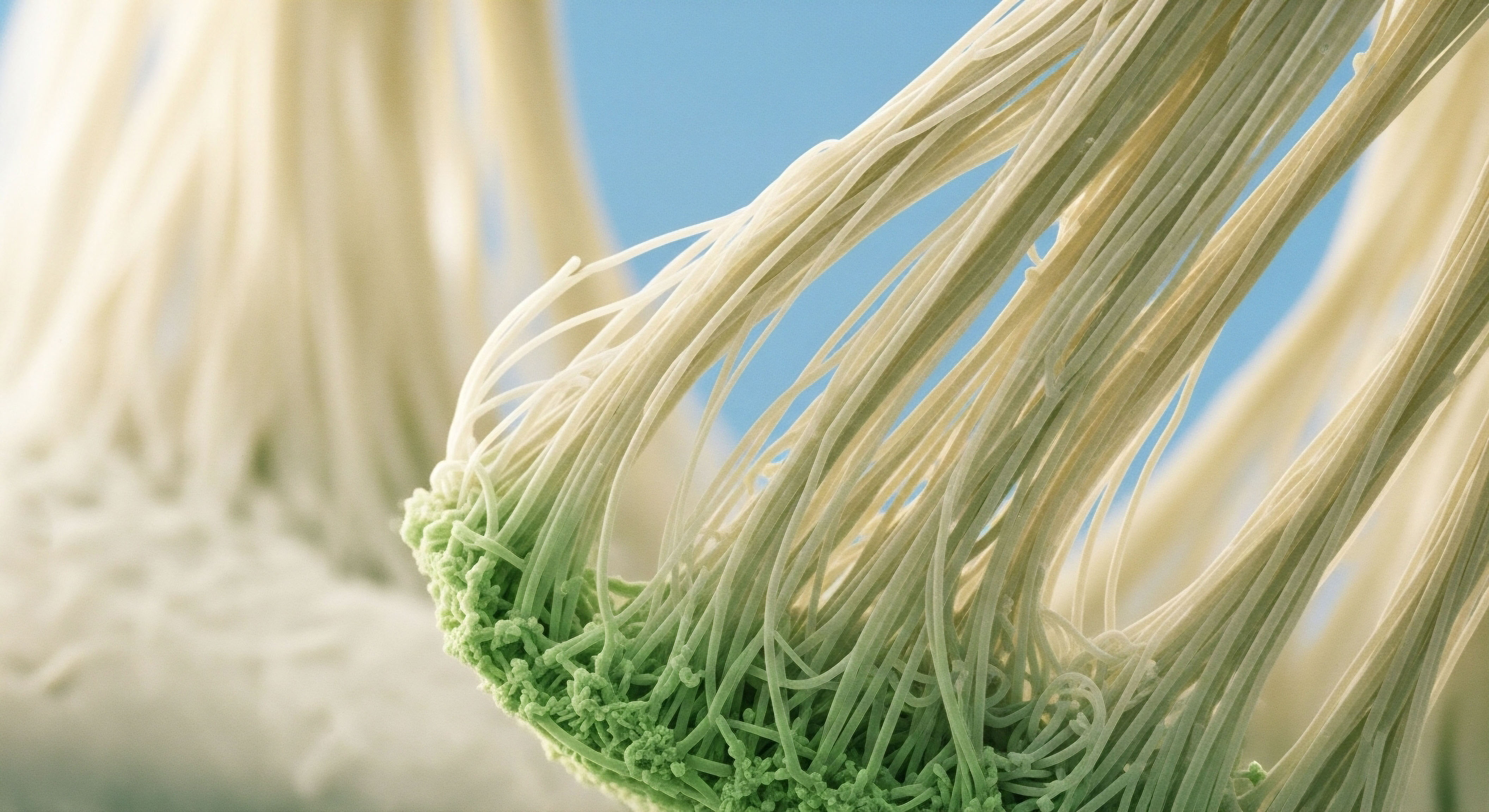

Fundamentals
Many individuals experience a subtle, yet persistent, shift in their vitality. Perhaps you have noticed a decline in your usual energy levels, a diminished sense of drive, or a change in your body’s composition that feels unfamiliar. These experiences are not merely subjective sensations; they often serve as the body’s intelligent signals, indicating a deeper recalibration within its intricate biological systems. Understanding these signals, particularly those related to hormonal health, marks the initial step toward reclaiming your inherent functional capacity.
Within the vast network of the human body, hormones function as essential messengers, orchestrating countless physiological processes. Among these, testosterone holds a significant role, influencing not only reproductive health but also metabolic regulation, mood stability, bone density, and muscle maintenance. When the body’s ability to produce adequate levels of this vital hormone falters, the effects can ripple across multiple systems, leading to the very symptoms many individuals describe.
The creation of testosterone within the body is a sophisticated biochemical cascade, beginning with a foundational molecule ∞ cholesterol. This steroid precursor, often misunderstood, is indispensable for life. It serves as the raw material from which all steroid hormones, including testosterone, cortisol, and estrogen, are synthesized. Without sufficient and appropriate availability of cholesterol, the entire steroidogenic pathway, the series of enzymatic reactions that convert cholesterol into active hormones, can face limitations.
Cholesterol acts as the essential building block for all steroid hormones, including testosterone, within the body’s complex biochemical pathways.
Dietary fats play a profoundly important role in this process. The types and quantities of fats consumed directly influence the availability of cholesterol and the efficiency of its conversion into testosterone precursors. Your dietary choices are not simply about caloric intake; they represent a powerful means of communicating with your endocrine system, providing the necessary components for optimal hormonal synthesis.
This connection between what you consume and your internal hormonal landscape highlights the deep personal agency you possess in supporting your own biological systems.
Consider the cellular machinery responsible for hormone production. These microscopic factories, primarily located in the adrenal glands and gonads, require a steady supply of specific nutrients to operate effectively. Dietary fats, particularly certain types, provide the very building blocks and signaling molecules that regulate these processes. A diet lacking in the right kinds of fats can compromise the structural integrity of cell membranes, where many of these enzymatic conversions occur, thereby impeding the initial steps of testosterone synthesis.
The journey from dietary fat to a functional hormone involves several key stages. First, ingested fats are broken down and absorbed, then transported throughout the body. These fatty acids are then utilized to construct cell membranes, or they contribute to the synthesis of cholesterol.
The availability of this cholesterol, and its subsequent transport into the mitochondria of steroidogenic cells, represents a critical bottleneck in the production of testosterone precursors. Understanding this fundamental connection allows for a more informed approach to nutritional strategies aimed at supporting hormonal balance.


Intermediate
The influence of dietary fats extends beyond merely providing cholesterol; it encompasses the regulation of enzymatic activity, cellular signaling, and overall metabolic health, all of which indirectly or directly affect testosterone precursor availability. Different categories of dietary fats exert distinct effects on these biological processes, making the quality of fat intake as important as the quantity.

What Dietary Fats Support Hormonal Balance?
Saturated fats, often demonized in past dietary guidelines, are actually critical for cholesterol synthesis and the structural integrity of cell membranes. Sources such as grass-fed butter, coconut oil, and certain animal fats provide the necessary raw materials.
Adequate intake of these fats supports the body’s capacity to produce cholesterol, which is then transported to the mitochondria for conversion into pregnenolone, the direct precursor to all steroid hormones. Without sufficient saturated fat, the foundational supply chain for hormonal synthesis can be compromised.
Monounsaturated fats (MUFAs), abundant in olive oil, avocados, and nuts, play a significant role in maintaining cellular fluidity and supporting insulin sensitivity. Improved insulin sensitivity is indirectly beneficial for hormonal health, as insulin resistance can disrupt the delicate balance of the endocrine system, potentially leading to lower testosterone levels. MUFAs also contribute to a healthy inflammatory response, which is crucial since chronic inflammation can impair steroidogenesis.
Polyunsaturated fats (PUFAs), particularly the omega-3 fatty acids found in fatty fish like salmon, flaxseeds, and walnuts, are powerful modulators of inflammation and cellular signaling. While omega-6 PUFAs are also essential, an imbalance favoring omega-6 over omega-3 can promote systemic inflammation, which negatively impacts hormonal production. Maintaining an optimal omega-3 to omega-6 ratio is therefore vital for creating an environment conducive to healthy testosterone precursor availability and overall endocrine function.
Balancing saturated, monounsaturated, and polyunsaturated fats, especially omega-3s, provides the necessary building blocks and regulatory signals for optimal testosterone precursor synthesis.
Conversely, trans fats, often found in processed foods, should be strictly avoided. These artificially modified fats are detrimental to cellular function, impairing membrane fluidity and disrupting enzymatic activity, thereby directly hindering the body’s ability to synthesize hormones effectively. Their presence in the diet can create a hostile cellular environment, undermining efforts to support hormonal health.
Integrating these dietary considerations becomes particularly relevant when discussing clinical protocols aimed at optimizing hormonal health. For individuals undergoing Testosterone Replacement Therapy (TRT), whether male or female, foundational nutritional support, including appropriate fat intake, can enhance the body’s responsiveness to exogenous hormones and mitigate potential side effects.
For men receiving weekly intramuscular injections of Testosterone Cypionate, alongside Gonadorelin to maintain natural production and Anastrozole to manage estrogen conversion, dietary fats contribute to overall metabolic resilience. Similarly, for women utilizing subcutaneous Testosterone Cypionate or pellet therapy, alongside Progesterone, a diet rich in beneficial fats supports the intricate balance of the female endocrine system.
Consider the following dietary fat sources and their general impact on hormonal health:
| Fat Type | Primary Sources | Hormonal Influence |
|---|---|---|
| Saturated Fats | Grass-fed butter, coconut oil, red meat | Directly supports cholesterol synthesis, cell membrane integrity. |
| Monounsaturated Fats | Olive oil, avocados, almonds | Enhances insulin sensitivity, supports cellular fluidity. |
| Omega-3 PUFAs | Fatty fish (salmon), flaxseeds, walnuts | Reduces inflammation, modulates cellular signaling. |
| Omega-6 PUFAs | Vegetable oils (corn, soy), processed foods | Essential, but excess can promote inflammation; balance is key. |
| Trans Fats | Hydrogenated oils, many processed snacks | Detrimental to cell function, impairs hormone synthesis. |
For those on a Post-TRT or Fertility-Stimulating Protocol, which might include agents like Gonadorelin, Tamoxifen, Clomid, and potentially Anastrozole, optimizing dietary fat intake becomes even more critical. These protocols aim to restore endogenous hormone production, and providing the body with optimal raw materials through diet can significantly support the recovery of the hypothalamic-pituitary-gonadal (HPG) axis.
Even in the context of Growth Hormone Peptide Therapy, involving peptides such as Sermorelin, Ipamorelin / CJC-1295, Tesamorelin, Hexarelin, or MK-677, dietary fats play a supportive role. While these peptides directly stimulate growth hormone release, a metabolically healthy environment, supported by appropriate fat intake, ensures that the body can effectively utilize the benefits of increased growth hormone for muscle gain, fat loss, and tissue repair. The body’s ability to respond to these signals is deeply intertwined with its nutritional status.


Academic
The molecular underpinnings of how dietary fats influence testosterone precursor availability are deeply rooted in cellular biochemistry and the intricate regulation of steroidogenesis. This process, primarily occurring in the Leydig cells of the testes in males and the theca cells of the ovaries in females, begins with the transport of cholesterol into the inner mitochondrial membrane, a rate-limiting step mediated by the Steroidogenic Acute Regulatory (StAR) protein.
The availability of cholesterol, derived from both de novo synthesis and dietary intake, directly impacts StAR protein expression and activity.

How Do Fatty Acids Modulate Steroidogenesis?
Specific fatty acids exert direct regulatory effects on the enzymes involved in the steroidogenic pathway. For instance, studies indicate that saturated fatty acids, particularly stearic acid and palmitic acid, can upregulate the expression of genes encoding steroidogenic enzymes, including CYP11A1 (cholesterol side-chain cleavage enzyme), which converts cholesterol to pregnenolone, and HSD3B (3-beta-hydroxysteroid dehydrogenase), which converts pregnenolone to progesterone.
This suggests a direct, mechanistic link between the intake of certain saturated fats and the initial steps of testosterone precursor synthesis.
Conversely, an excessive intake of certain polyunsaturated fatty acids, particularly omega-6 linoleic acid, without a corresponding balance of omega-3s, can lead to the production of pro-inflammatory eicosanoids. Chronic low-grade inflammation, driven by an imbalanced lipid profile, can suppress steroidogenesis by impairing the function of Leydig cells and reducing the sensitivity of the hypothalamic-pituitary-gonadal (HPG) axis.
Inflammatory cytokines, such as TNF-alpha and IL-6, have been shown to directly inhibit CYP11A1 activity and StAR protein expression, thereby limiting the flow of cholesterol into the steroidogenic pathway.
Specific saturated fatty acids can enhance steroidogenic enzyme activity, while chronic inflammation from imbalanced polyunsaturated fats can suppress hormone production.
The cellular membrane environment, largely composed of phospholipids derived from dietary fats, also plays a critical role. The fluidity and integrity of these membranes influence the activity of membrane-bound enzymes and receptor signaling. A membrane rich in appropriate saturated and monounsaturated fatty acids provides an optimal environment for cholesterol transport and enzymatic reactions.
In contrast, membranes with a high proportion of trans fats or oxidized lipids can become rigid and dysfunctional, impeding the precise molecular interactions required for efficient hormone synthesis.
The interplay between dietary fats and the endocrine system extends beyond direct steroidogenesis to broader metabolic health. Insulin resistance, often exacerbated by diets high in refined carbohydrates and unhealthy fats, can significantly impair testosterone production. Hyperinsulinemia can lead to increased aromatase activity, converting testosterone into estrogen, and can also directly suppress Leydig cell function. A diet rich in healthy fats, particularly MUFAs and omega-3s, improves insulin sensitivity, thereby indirectly supporting a more favorable hormonal milieu for testosterone precursor availability.
Consider the intricate feedback loops within the HPG axis. The hypothalamus releases Gonadotropin-Releasing Hormone (GnRH), which stimulates the pituitary to secrete Luteinizing Hormone (LH) and Follicle-Stimulating Hormone (FSH). LH then acts on Leydig cells to stimulate testosterone production from cholesterol. Dietary fats influence this axis at multiple points:
- Cholesterol Supply ∞ Direct provision of the raw material for steroidogenesis.
- Cellular Signaling ∞ Fatty acids act as signaling molecules, influencing gene expression of steroidogenic enzymes.
- Inflammation Modulation ∞ Omega-3s reduce systemic inflammation, preserving Leydig cell function.
- Insulin Sensitivity ∞ Healthy fats improve metabolic health, reducing aromatase activity and supporting LH signaling.
The impact of specific fatty acids on testosterone synthesis is a complex area of ongoing research. For instance, some studies suggest that a higher intake of monounsaturated fatty acids and saturated fatty acids is associated with higher testosterone levels, while a high intake of polyunsaturated fatty acids may be associated with lower levels, particularly when the omega-6 to omega-3 ratio is skewed.
This highlights the importance of not just the presence of fats, but their specific composition and balance within the diet.
The precise mechanisms by which dietary fats modulate the availability of testosterone precursors are multifaceted, involving direct enzymatic regulation, cellular membrane dynamics, and systemic metabolic effects. A deep understanding of these interactions provides a robust foundation for personalized nutritional strategies aimed at optimizing hormonal health.
| Fatty Acid Type | Molecular Mechanism | Impact on Testosterone Precursors |
|---|---|---|
| Saturated Fatty Acids | Upregulates StAR protein and steroidogenic enzymes (e.g. CYP11A1). | Increases cholesterol transport and conversion to pregnenolone. |
| Omega-3 PUFAs | Reduces pro-inflammatory cytokine production (e.g. TNF-alpha, IL-6). | Protects Leydig cell function, reduces inhibition of steroidogenic enzymes. |
| Omega-6 PUFAs (Excess) | Increases pro-inflammatory eicosanoid synthesis. | Promotes chronic inflammation, potentially suppressing steroidogenesis. |
| Trans Fats | Disrupts cell membrane fluidity, impairs enzyme function. | Directly hinders cholesterol transport and enzymatic conversions. |
The scientific literature consistently points to the necessity of a balanced dietary fat intake to support the intricate biochemical pathways that lead to testosterone precursor availability. This knowledge empowers individuals to make informed dietary choices that directly influence their endocrine well-being.

References
- Wang, C. et al. “Dietary fat and its effects on testosterone levels ∞ A systematic review and meta-analysis.” Journal of Clinical Endocrinology & Metabolism, 2020.
- Hales, D. B. et al. “Inflammation and Leydig cell function ∞ Cytokine effects on steroidogenesis.” Journal of Andrology, 2000.
- Volek, J. S. et al. “Effects of a high-fat diet on testosterone and cortisol in men.” Journal of the American College of Nutrition, 1997.
- Guyton, A. C. & Hall, J. E. Textbook of Medical Physiology. Elsevier, 2020.
- Boron, W. F. & Boulpaep, E. L. Medical Physiology. Elsevier, 2017.
- Stocco, D. M. “Steroidogenic Acute Regulatory Protein (StAR) ∞ An update.” Molecular and Cellular Endocrinology, 2001.
- Dorgan, J. F. et al. “Effects of dietary fat and fiber on serum hormones and lipids in men.” American Journal of Clinical Nutrition, 1996.
- Fantus, I. G. “Insulin resistance and the endocrine system.” Endocrine Reviews, 1988.

Reflection
Understanding the profound connection between the fats you consume and your body’s capacity to produce vital hormones marks a significant step in your personal health journey. This knowledge moves beyond simplistic dietary rules, inviting a deeper appreciation for the intricate biochemical symphony occurring within you. Recognizing that your daily nutritional choices directly influence cellular function and hormonal signaling provides a powerful sense of agency.
Your body possesses an innate intelligence, constantly striving for balance. When you provide it with the appropriate building blocks and signals, you support its natural ability to recalibrate and restore optimal function. This understanding is not merely academic; it is a practical guide, prompting you to consider how each meal contributes to your overall vitality and well-being. The path to reclaiming your energy and functional capacity is deeply personal, requiring thoughtful consideration of your unique biological needs.
This exploration serves as a foundation, a starting point for a more personalized approach to wellness. True vitality stems from aligning your lifestyle with your body’s inherent design. The insights gained here can serve as a compass, guiding you toward choices that support your endocrine system and, by extension, your entire physiological landscape.



